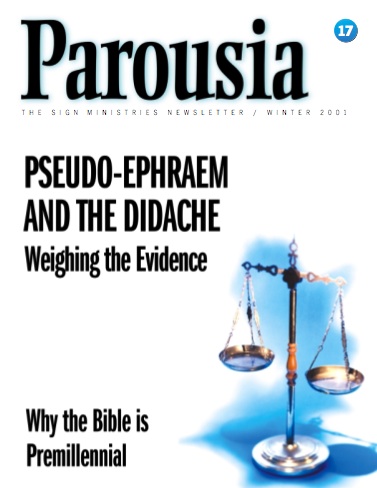
Click here to download this excellent article explaining what these two Church historical documents say about the timing of the Second Coming.
Olivet Discourse
What Did the Early Church Fathers Teach on the Timing of the Second Coming?

This presentation on what the early church taught was given last October in O’Fallon Missouri at an eschatology forum. There are three speakers who had twenty minutes each to give their case: Steve Gregg (Preterist), Charles Cooper (Prewrath), Thomas Ice (Pretribulational).
I have included Steve Gregg’s presentation because I want you to hear what a preterist case sounds like. It goes something like this:
“Ok, I grudgingly admit that preterism was never taught in the first three hundred years by a Church Father. But who knows!…maybe one day someone may stumble upon in the sands of Egypt an early Church document with preterist teachings, so therefore we can never be too sure what the early Church taught on this subject.”
What Gregg also does is he invokes sparse preterist writings from the Church Fathers from AD 300-700 to cast doubt on what the early Church taught, as if they have the same weight as futurist writings from the first and second generations of the Church!
In the second presentation, Cooper demonstrates that the early Church clearly taught that the Church would encounter the Antichrist’s Great Tribulation. Cooper even cites in support the authoritative church historian Larry V. Crutchfield, who, himself is a pretribulationalist!
In the third presentation, Ice focuses on the premillennial issue. Prewrath is premillennial as well so we can agree with Ice’s points on that issue.
However, Ice makes a false claim by asserting that the early Church Fathers believed in imminency. They certainly did not believe in imminency in the pretribulational sense that the Church would be raptured before the Antichrist’s Great Tribulation. And some believed that the Church would be raptured soon because they thought that they were in the midst of the Great Tribulation! So Ice’s statements are misleading and incorrect.
The only early citation that Ice attempts to produce is a statement from The Shepherd of Hermas, in which he reads his pretribulational system into this ancient document. He (selectively) cites a statement from Vision 4 that says that if someone has enough faith they can escape a great tribulation. What Ice does is anachronistically reads “escape” as a rapture. But there is nothing in the text that suggests a rapture. In fact, the “escape” in that context indicates a physical escape leaving the person on earth (see Vision 4:2). Nor does Hermas place the Return of Christ before the Great Tribulation. Further, Hermas actually makes statements of enduring the Great Tribulation:
“Blessed are those of you who patiently endure the coming great tribulation and who will not deny their life.” (Vision 2:2)
“Therefore those who endure and pass through the flames will be purified by them…The white part is the age to come, in which God’s elect will live because those chosen by God for eternal life will be spotless and pure…You have also the foreshadowing of the great tribulation that is coming” (Vision 4:3)
It should also be mentioned that like so many of the other early Church Fathers’ exposition of Scripture, this document instead is not didactic intending to interpret what the Bible teaches on the Second Coming — it is part of a vision. The fact that this is the only citation that Ice can produce within the first four hundred years of Church History is very telling.
Ice also invokes a later Church document called Pseudo-Ephraem and purports that there are pretrib statements. This has been thoroughly refuted in this Parousia Newsletter.
In summary, the term “Prewrath” is new, but its essential teaching goes back to the early Church writers, contra preterism, pretribulationism, and amillennialism.
Download as MP3
This week on Gary DeMar’s radio program he responded to the Prewrath position, briefly. For those who do not know Gary DeMar, he is a preterist author and teacher. Listening to his comments on the Prewrath position, I found them surface-level at best. Basically, his conclusion was: since Prewrath shares a futurist approach to Matthew 24 along with pretribulationism, prewrath does not have any new critiques for the preterist position.
He also claims that Prewrath does not have good scholarly exegesis that would critique preterism as well as support prewrath. I find this odd since it has been over a year now that Charles Cooper’s book has been published, God’s Elect and the Great Tribulation: An Interpretation of Matthew 24:1-31 and Daniel 9. This book is a solid, scholarly book that not only supports prewrath but has substantive critiques against preterism, some critiques that I am sure Gary DeMar is not even aware of. So I would challenge DeMar to read the book and respond to it.
Moreover, Gary DeMar in his show laments that premillennialist teachers are not eager to debate or interact with preterists. I will give DeMar the benefit of the doubt here since he is mostly (if not exclusively) exposed to pretrib premillennialists.
DeMar has debated pretrib teacher Thomas Ice for example, and I have heard this debate, which I was left shaking my head since I was not impressed by either of them. (Incidentally, Thomas Ice will not defend his pretribulationism in debate with a prewrath teacher, but he will with a preterist. That should tell you something.)
I am writing a couple of books right now and my second book is specifically on a refutation of preterism. Would it not be fitting that once that book is published there could be a public debate with DeMar with copious amounts of cross-examination? I think so. And I am sure Cooper would desire to defend his exegesis in his book in a debate with a preterist.
One of the radio programs that DeMar comments on the Prewrath, he gave his garden-variety preterist arguments to Matthew 24: “This generation,” the second-person “you,” the term “Antichrist” is not mentioned, etc., etc. He also gives the impression that “we preterists are scholarly, and you premillers over there are just ‘popular.'”
I was at a conference in Florida earlier this year where I met DeMar briefly, unrelated to eschatology, but he had a booth in which I bought several preterist books that I have been wanting to read for a while. I was disappointed by these preterist books since they did not provide much meaningful exegesis. And some of the salient issues that should have been discussed were completely ignored such as distinct purposes of the gospel writers for the Olivet Discourse (Preterists just assume that the writers had one purpose).
Again, I give DeMar the benefit of the doubt since he has been exposed all his life to sensational-popular, surface-level pretrib teachers who are not interested in meaningful interaction. But there is a new kid in town, the prewrath position, a kid who is much more sober about the Biblical text and seeks to be exegetically faithful to Scripture.
The Final Judgments

Charles Cooper explicates the doctrine of the final eschatological judgments. Amillennialists wrongly ignore specific aspects of the final judgment and end up focusing on generalities. This presentation was given last October in O’Fallon Missouri at an eschatology forum.
Download as MP3
Open up your Bibles.
There have been some interpreters of Matthew 24 that have wrongly viewed the martyrdom contained in verse nine as disconnected from the martyrdom of the great tribulation in verses 15-22. The grammar and context militates against such an interpretation.
In Matthew 24:5-14, Jesus describes mostly general events that will happen up to the end of the age. Then in verses 15-22, Jesus unpacks the martyrdom that he mentioned in verse nine.
Here are the reasons we know that starting in verse fifteen Jesus provides a parenthetical account of the martyrdom.
1) Jesus begins verse fifteen with “Therefore” (οὖν). This is a common discourse indicator, which in this case is giving an inference of what came before verse fifteen. In addition, the very use of “therefore” demonstrates that the audience before verse fifteen is the same audience after verse fifteen.
2) In verses 5-14 there is a general or “shotgun” description of events that will precede the end of the age. But in verses 15-22, Jesus focuses in on the monumental event that will be the cause of death for Christians: the “abomination of desolation” followed by the consequent persecution terror of the great tribulation.
3) Finally, this point is often missed, but the same Christian audience in verses 5-14, who will experience those events, is the same audience in verses 15-22 because Jesus uses the second person plural, “you” in both sections without any hint that he has two completely different groups of believers in mind.
